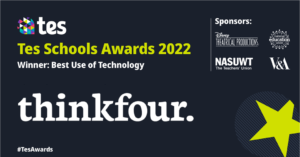

Watch this to focus on the Extended Marketing MIx for Higher Business (…and pack your bags)
London, England. A megacity with a population of over 9 million, and that’s just the people who live there. That number doesn’t account for the 1.3 million annual visitors paying for accommodation.
For the hotel industry, that’s an average of 3500 paying customers per night. Big money, and with over 4,000 accommodations to choose from, how do London’s tourists and visitors decide where to stay?
While they may not realize, they’re probably examining elements of the extended marketing mix.
So, get your bags packed and let’s take a look.
this is ThinkFour.
If you’ve studied N5 Business, you’ll be familiar with the 4 P’s of the marketing mix. At Higher level, there are 7 P’s, so we call it the extended mix.
The first of these additions is People. Imagine you’ve selected your London hotel for the weekend. When you arrive, who’s the first person you’re likely to meet? A member of staff, probably a doorman or receptionist. The People element is exactly what it sounds like – employees. And if you’re a hotel receptionist then you’re responsible for creating that positive first impression on customers. During your hotel stay you’ll likely also encounter other employees such as waiters, concierge, and cleaning staff.
From the hotel manager’s perspective, what methods can they employ to ensure that their staff are as effective as possible in delivering customer service. To achieve full marks in an exam scenario, consider the methods that could be used but also think about ‘why’ these are relevant. Here’s an example of a good answer [on screen text 1]:
An employee such as a hotel receptionist should be well trained and knowledgeable on the local area; this means they can answer customer queries effectively such as advice on local public transport
The next element is Process, and this is also significant for a tertiary sector business like a hotel. Process is the way in which a customer receives a service or makes a purchase.
Again imagine you’ve just arrived at your hotel, you definitely don’t want to queue for a long time to be checked in. During your stay you’ll want to have your room cleaned regularly and have fresh towels. It’s all part of the service you receive, all the way until you leave when you want the check-out process to be as smooth as possible.
Similar to People, go beyond simply considering the methods needed to deliver a good process, to the justification of why these things are important. Here’s a worked example [on screen text 2].
Hotels may implement new technologies for customers such as touch screen check-in or contactless payment methods. This makes the process less time consuming and even more hygienic for customers
Lastly, we come to Physical Evidence. Chances are you’ll probably book your hotel in London online using the hotel website itself or a comparison site. Before making the actual booking, you might check an online review platform like TripAdvisor to see what previous customers have said about the hotel. So by this point you’ve already encountered two sources of evidence that portray an image of this hotel to you as a customer.
Physical evidence within the hotel itself which may affect your customer experience is abundant; the hotel room itself, is it spacious and clean? Does it have a modern or traditional style? Does it have good Wifi and air conditioning? Is there a drinks fridge or coffee machine there for you?
Let’s take one last example of an exam style response and again notice the inclusion of not only the things listed just now, but the significance of them [on screen text 3]:
Ensuring that hotel rooms are cleaned regularly and that customers have access to fresh towels daily, will ensure customer satisfaction and may lead to positive reviews online - enhancing the hotel’s reputation
This topic is especially popular for Higher candidates tackling the coursework assignment.
There’s a vast bank of customer reviews on hotels, restaurants and more on websites such as TripAdvisor and Booking.com. This may be a rich source of information for you should you choose to look at a tertiary sector business for your assignment.
Alternatively, this could also be a great excuse to engage in some first-hand field research and book yourself a trip to a fancy hotel in London!
Thanks for watching, this is ThinkFour.



| Cookie | Duration | Description |
|---|---|---|
| cookielawinfo-checbox-analytics | 11 months | This cookie is set by GDPR Cookie Consent plugin. The cookie is used to store the user consent for the cookies in the category "Analytics". |
| cookielawinfo-checbox-functional | 11 months | The cookie is set by GDPR cookie consent to record the user consent for the cookies in the category "Functional". |
| cookielawinfo-checbox-others | 11 months | This cookie is set by GDPR Cookie Consent plugin. The cookie is used to store the user consent for the cookies in the category "Other. |
| cookielawinfo-checkbox-necessary | 11 months | This cookie is set by GDPR Cookie Consent plugin. The cookies is used to store the user consent for the cookies in the category "Necessary". |
| cookielawinfo-checkbox-performance | 11 months | This cookie is set by GDPR Cookie Consent plugin. The cookie is used to store the user consent for the cookies in the category "Performance". |
| viewed_cookie_policy | 11 months | The cookie is set by the GDPR Cookie Consent plugin and is used to store whether or not user has consented to the use of cookies. It does not store any personal data. |
